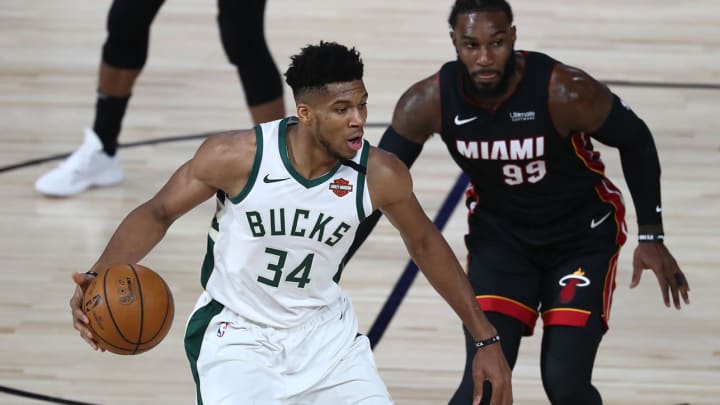A Giannis-Like Extension Remains the Exception, Not the Rule

LeBron James and Anthony Davis are in Los Angeles, Kevin Durant and Kyrie Irving are in New York, and Giannis Antetokounmpo is staying in Milwaukee. This last bit is the news of the day, and it’s not just great for Milwaukee—it looks like a victory for other small-market teams. But is it?
LeBron is a trendsetter. Giannis might be an exception. He was a late bloomer, a mid-first-round draft pick (in a historically awful draft!), a European who did not grow up expecting to become an NBA star. He also plays for a well-run organization that has built a true championship contender.
Context is important here. Since the NBA left its bubble just six weeks ago, John Wall got traded (his wish, evidently), Russell Westbrook got traded (his wish too), and James Harden’s camp is leaking preferred trade destinations on an almost-daily basis.
The NBA does have a big-market/small-market problem, but what it really has is a superstars-teaming-together … uh, dynamic. Whether it’s a problem depends on your point of view, and perhaps which superstars are teaming together and where. (Personally, I found Durant on the Warriors uninteresting, but I think Durant and Irving in Brooklyn will be fascinating.)
Milwaukee has pulled off a rare feat in signing Antetokounmpo to a third contract. Portland did the same with Damian Lillard. In both cases, the player was committed to finishing what he started. But again: They are exceptions. The question for aspiring teams is how they get an exception of their own.
The NBA is a league of player movement—stars have power and are relentlessly aware of it. Time moves fast in sports. Most athletes peak in their 20s; they don’t accumulate 20 or 30 years of knowledge and experience before rising to the top like people in many other professions. Today’s 15-year-old basketball star is a decade away from free agency.
James left Cleveland for Miami 10 years ago. Everybody who enters the NBA now grew up in a post-Decision world. Players understand implicitly: Teams are not families. They are employers. They have to prove their value to their best employees, or they will lose them.
As soon as a franchise drafts a superstar, the clock starts ticking … but the good news is that it ticks for a long time. James gave the Cavs seven years to find a second star for his first stint, and then he left. The Pelicans had seven years to build a contender around Davis. Today’s NBA salary structure is designed to buy time for small-market franchises: They get four years of a rookie deal (including a team option) and then a chance to offer the first huge contract of a player’s career, in the form of an extension after three seasons that kicks in starting in year five. Jayson Tatum, De’Aaron Fox, Bam Adebayo and Donovan Mitchell just signed those. Fox’s decision is most telling: Sacramento has not made the playoffs with him, but it still retained his services. If he leaves the Kings in three years, that’s the Kings’ failure.
So teams have time to build and give themselves a chance to keep their stars. They just have to build properly, and to the liking of the star. There were moments when Milwaukee risked botching this—most notably, when the Bucks let Malcolm Brogdon leave as a restricted free agent in 2019. But the Bucks have won a lot of games and they knew their guy. They knew it when they paid a massive price for Jrue Holiday last month—those first-round picks will almost certainly be late first-rounders now, and the pick swaps are probably meaningless. The Bucks seemed to understand they had to please one person: Antetokounmpo. And they did it.
There is a way to make Antetokounmpo the rule instead of the exception. It’s pretty simple, actually: Keep the salary cap, but get rid of the whole concept of “max” contracts. If somebody wants to pay James $100 million a year and surround him with minimum-salary guys, let them. Superstars would get paid even more than they already do—and most teams would not have room for more than one. They would be spread throughout the league.
Instead, the NBA places an artificial restriction on the best players’ salaries—and so, rather than seek the most possible dollars, as baseball free agents do, players seek the best possible team. As long as that system exists, players will take advantage. And that’s why Milwaukee fans should feel especially grateful today.

Michael Rosenberg is a senior writer for Sports Illustrated, covering any and all sports. He writes columns, profiles and investigative stories and has covered almost every major sporting event. He joined SI in 2012 after working at the Detroit Free Press for 13 years, eight of them as a columnist. Rosenberg is the author of "War As They Knew It: Woody Hayes, Bo Schembechler and America in a Time of Unrest." Several of his stories also have been published in collections of the year's best sportswriting. He is married with three children.
Follow rosenberg_mike